Paella
Serves 4
- 5tbsp sunflower oil
- 4 skinless and boneless chicken thighs
- 150g chorizo, cut into small dice
- 2 cloves of garlic, peeled and finely sliced
- 1 medium onion, finely diced
- 1 red bell pepper, finely diced
- 1½ litres vegetable or chicken stock
- ½tsp saffron strands
- 350g paella rice
- 1tsp smoked paprika
- 12 small clams, cleaned
- 12 mussels, cleaned and debearded
- 100g frozen peas
- 1 large tomato, cut into small dice
- 4 cloves of garlic, peeled and sliced
- 12 large raw prawns, deveined
- 1 medium squid, cleaned and sliced into rings
- 4 langoustines (optional)
- 5tbsp chopped flat-leaf parsley
- Pinch of flaked sea salt
- Grind of black pepper
- 1 lemon, cut into wedges
Add a tablespoon of sunflower oil to a frying pan over a medium heat. Fry the chicken thighs and leave to brown for three minutes on each side, put to one side, and cover with foil to keep warm.
Next, heat two tablespoons of oil in a paella or large frying pan over a medium heat. Add the chorizo and fry until the oils are starting to release, then add the garlic, onion and pepper to cook until softened.
Meanwhile, heat the chicken stock in a pan, add the saffron and mix.
Now add the paella rice to the paella pan and stir quickly until all the grains are completely coated and glossy. Add the paprika and pour in the hot saffron chicken stock. Wedge the chicken thighs deeply in the rice, with just the tops showing.
Over the next 15 minutes, add extra water, 100ml at a time, as the rice starts to absorb the stock. Be careful not to add too much, and stay with it, as you don’t want the bottom layer to catch and burn or the rice to dry out. Add the clams, mussels, peas and tomato, then continue to cook the gently bubbling paella for another 10 to 15 minutes while it continues to absorb liquid. Clean and dry your chicken pan, heat one tablespoon of oil and add half the garlic. Once it has started to brown, add the prawns two or three at a time so you don’t overcrowd the pan. Cook on both sides until all the prawns are done, adding a little more oil if needed.
Place on a plate lined with kitchen paper to absorb excess grease, then add the prawns to your paella. Clean and dry the pan again, place on a medium heat and add the last tablespoon of oil. When the oil is really bubbling, add the remaining garlic and then the squid rings. Give them 10 seconds in the pan to get some colour, turning to cook both sides, then evenly distribute the squid in the paella.
Finally, add the langoustines (if using) to the frying pan and allow the heat to cook them on all sides for a minute. Carefully transfer them into the paella. Scatter the parsley over the paella, season, then serve with lots of lemon wedges and aioli.
Recipe by Justine Murphy. The mymuybueno Cookbook (Meze Publishing, £25) is out now
Chicken Skewers with Tzatziki
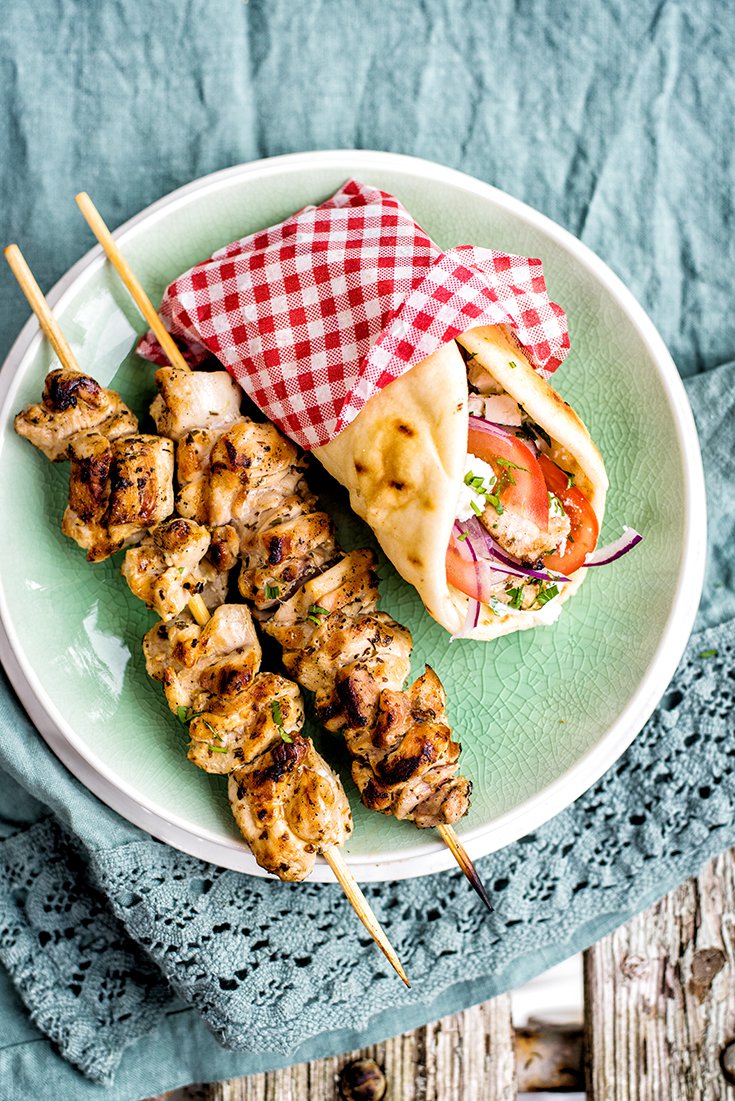
Serves 8
For the tzatziki:
- 150g cucumber (about half a large cucumber)
- 1tsp salt
- 300g full-fat Greek yoghurt
- 1 large garlic clove, minced
- 1tsp dried oregano
- 1tbsp olive oil, to drizzle (optional)
For the chicken skewers:
- 800g skinless chicken thighs
- 1-2tbsp olive oil Juice of half a lemon
- 1tbsp dried oregano
- 2tsp red-wine vinegar
- Salt
- Freshly ground pepper
To serve:
- 8 flatbreads
- 2 large vine tomatoes, sliced thinly
- 1 large red onion, sliced very thinly and mixed with 2 tbsp finely chopped flat-leaf parsley
- Crumbled feta cheese
To make the tzatziki, coarsely grate the cucumber in a bowl and sprinkle with the salt. Let it stand for five minutes and then use your hands to squeeze most of the moisture out. Mix well with the yoghurt, garlic and oregano. Add a drizzle of olive oil over the top. Chill until needed.
Soak your wooden skewers in cold water for 30 minutes so that they don’t burn. Dice the chicken into bite-sized pieces, removing any fatty bits. Put in a bowl with the olive oil, lemon juice, oregano and red-wine vinegar. Mix everything together and season liberally with salt and pepper. Leave to marinate for an hour (or overnight).
Thread the meat on to the skewers. Cook over a medium-hot barbecue, turning frequently, until the chicken is completely cooked through. Alternatively, heat a large frying or griddle pan and wipe with olive oil. Cook the skewers over a high heat, turning frequently so that they cook evenly. Check the chicken is fully cooked before serving.
Serve with warmed flatbreads, the tzatziki, a little sliced onion, tomato and some crumbled feta cheese.
Recipe from AO/Life
Portuguese Grilled Sardines
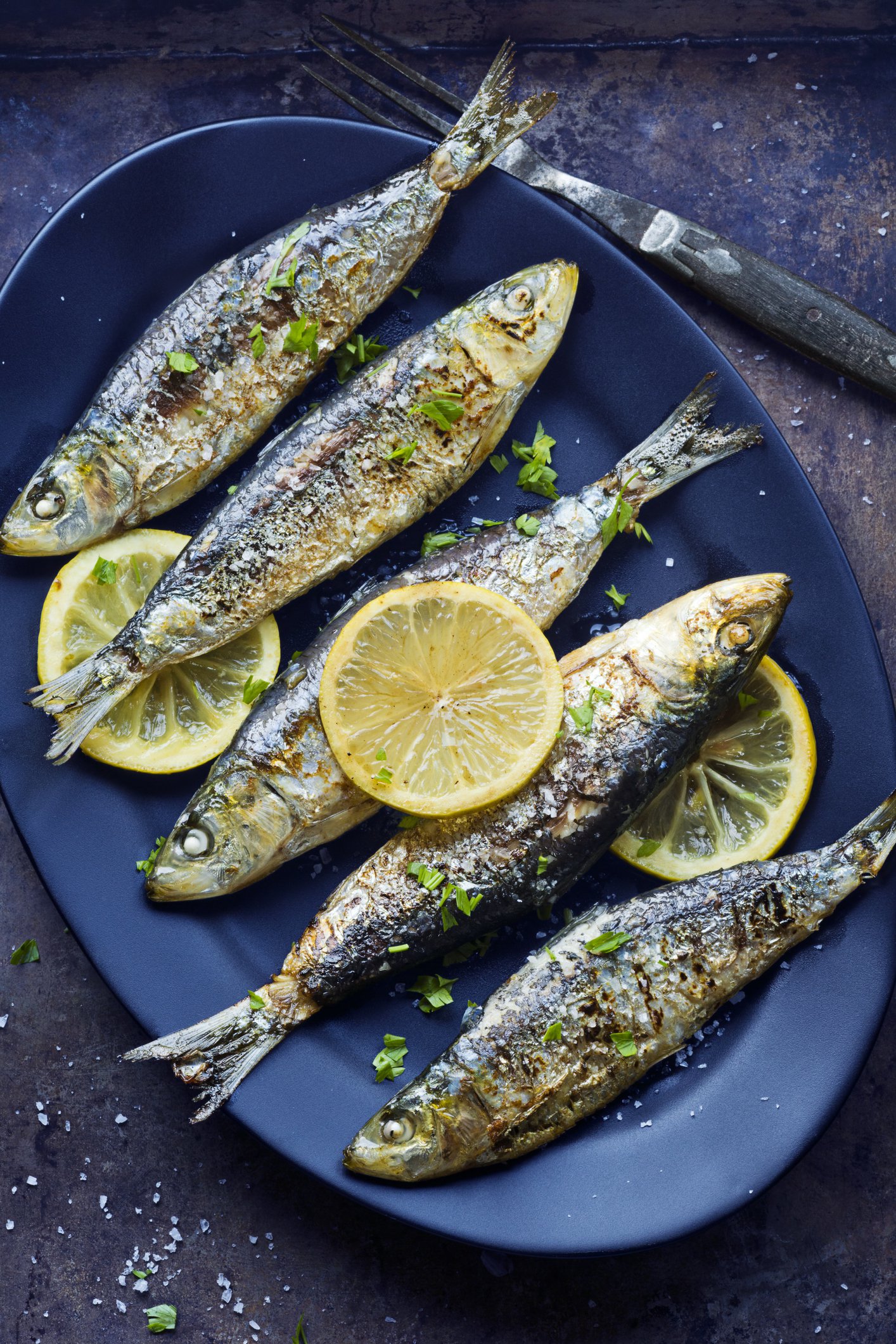
Serves 4
- 8 sardines (if you don’t mind the bones, cook them whole, or ask your fishmonger to butterfly them)
- Sea salt and olive oil
For the green pepper salad:
- 2 green peppers, roasted, peeled and cut into strips
- 1 medium onion, thinly sliced
- Small bunch of parsley leaves, finely chopped
- Small bunch of coriander leaves, finely chopped
- 3tbsp extra-virgin olive oil
- 1tsp white-wine vinegar
- ½ lemon, zest and juice
- Salt and black pepper
- Crusty white bread, to serve
To cook the sardines, simply preheat either a griddle or your barbecue and, when very hot, brush the sardines with some oil and season with salt. Grill them for three to four minutes in total or until crispy, making sure not to overcook them. Season again as soon as they are done.
When ready, place on top of some crusty white bread slices so all the fatty delicious juices from the fish soak into the bread. A traditional side dish is a green pepper salad. Simply combine all the ingredients, check the seasoning and serve alongside the sardines.
Recipe from Miele Der Kern
Sicilian tomato, radish and lemon salad
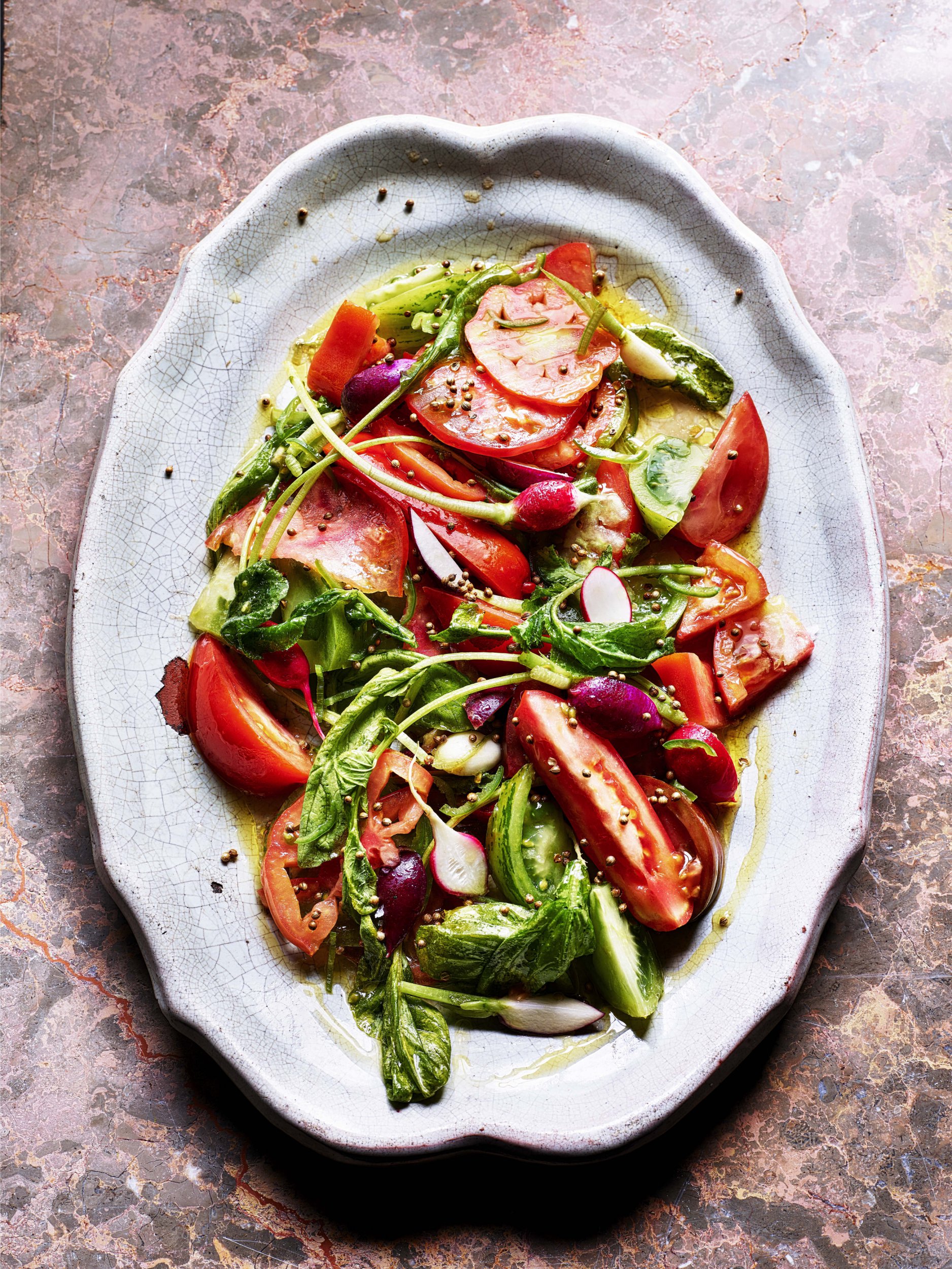
Serves 4
- 500g mixed seasonal tomatoes, stalks and eyes removed
- ½tsp sumac
- Juice of 1 lemon
- 1tbsp coriander seeds
- 12 breakfast radishes, leaves intact and washed
- 1 large green chilli, deseeded and finely sliced
- 75ml extra-virgin olive oil
- 50ml chardonnay or muscatel vinegar
- Sea salt and black pepper
First, prepare the tomatoes. Cut the smaller one in half and slice the larger into 1 cm rounds with a serrated knife. Place the tomatoes in a bowl, season with salt, pepper and the sumac and squeeze over the lemon juice. Toss well and leave to marinate for 10 minutes.
Place the coriander seeds in a pan and toast them for two to three minutes until fragrant, then immediately transfer them into the tomatoes.
Cut the radishes into four, lengthwise, with the leaf, and mix into the salad along with the chilli. Whisk together the extra-virgin olive oil and vinegar and stir this into the salad. Serve.
Recipe by Ben Tish of Norma
Moules marinière
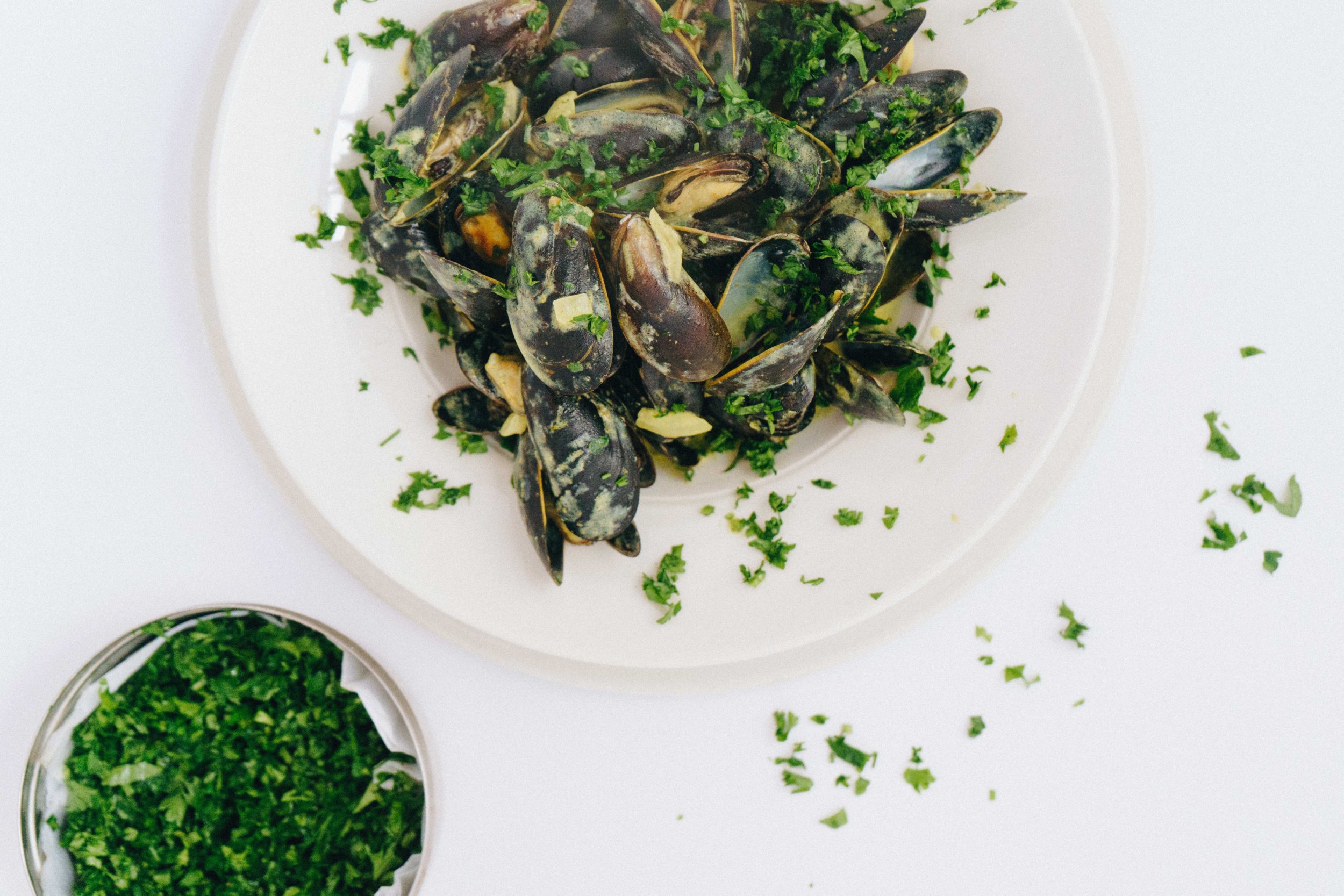
Serves 4
- 2kg mussels, as fresh as possible
- 20g salted butter
- 2 shallots, finely chopped
- 2 garlic cloves, finely chopped
- 1 sprig thyme
- 1 fresh bay leaf
- 100ml dry cider or white wine
- 100ml double cream
- Big handful roughly chopped parsley
- Black pepper
- Crusty bread, to serve
Wash the mussels well under cold, running water. Discard any open or damaged ones and any that won’t close when squeezed. With your fingers, pull out the “beards” (the small mass of elastic threads which hold the mussel to solid surfaces) that are sticking out from the shells. If there are any barnacles attached to the shells, scrape these off with a knife. Give the mussels a final rinse to remove any grit and set aside in a colander to drain.
Gently heat the butter in a large pan (big enough to take all the mussels so they half-fill it) and add the shallots, garlic, thyme and bay leaf. Allow everything to cook for a minute or so, until you can smell the garlic aroma. Add the mussels and cider or white wine, turn up the heat to full, then cover and allow to steam, giving the pan a shake every now and then. After three or four minutes, lift the lid and add the cream, parsley and a few twists of black pepper. Heat for 30 seconds longer. Spoon the mussels and sauce into large warmed bowls and serve with fresh crusty bread to mop up.
Recipe from Rupert Willday, head of food, Charlie Bigham’s
Shakshuka with roasted red and yellow peppers and feta
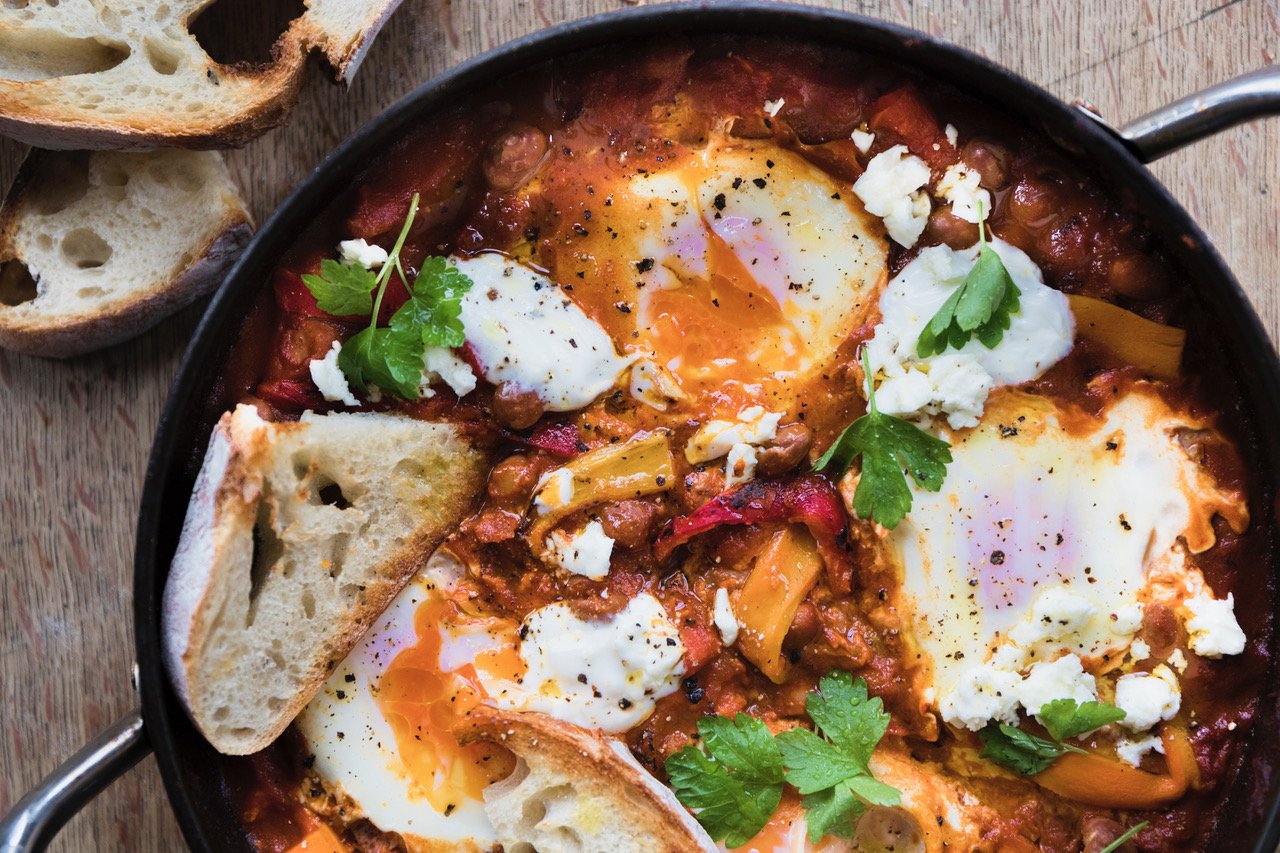
Serves 4
- 6tbsp olive oil
- 1 onion
- 2-3 cloves of garlic
- 2tsp smoked paprika
- 2tsp cumin
- 800g chopped tomatoes
- 200g roasted red and yellow peppers
- 400g borlotti beans, drained
- 4 eggs
- 50g feta
- Coriander or parsley
- 3tbsp natural yoghurt
Heat four tablespoons of olive oil in a deep frying pan and add the sliced onion with a large pinch of salt. Cook on a low heat for 10 minutes. Crush the garlic and add to the pan with the two remaining tablespoons of olive oil and cook for two minutes.
Turn the heat up to medium and add the spices, stir well and then add the tomato followed by two cans of water. Simmer.
Slice the peppers, add to the pan and simmer for 30 to 40 minutes. Once the sauce has reduced a little, add the drained beans, stir and season. If you need to add a little more water, then do. Make little wells with the back of a spoon and drop in the eggs one by one. Cover the pan with a lid and turn the heat down to let the eggs cook, for three minutes.
Spoon over the yoghurt, crumble over the feta and sprinkle on the herbs, then serve with crusty bread.
Recipe by Milli Taylor for Odysea
Home-made Gnocchi with kale
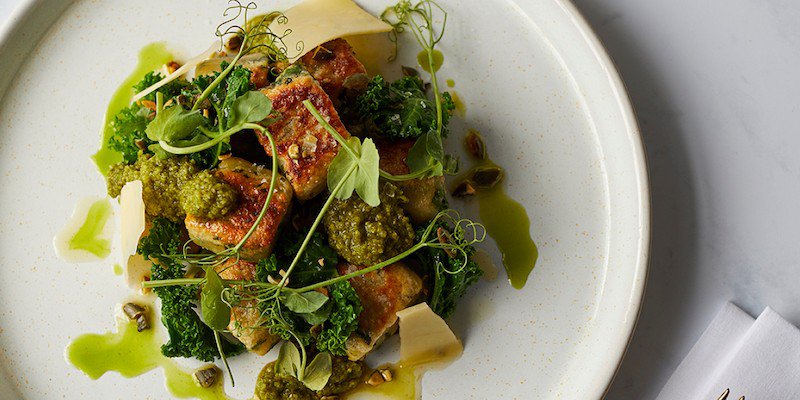
Serves 6
For the gnocchi:
- Rock salt, for baking potatoes
- 1kg Désirée potatoes
- 250g plain flour
- ½tsp fine sea salt
- 2 small eggs
- 1 small punnet of pea shoots
- Salt, to taste
For the pesto:
- 1 small bunch of green kale, leaves removed and stalks set aside
- 1 bunch flat-leaf parsley
- 1 bunch basil
- 2 garlic cloves
- 1 lemon, zest and juice
- 50g Parmesan or pecorino, half finely grated and half into shavings for garnish
- 50-100ml good-quality olive oil
- 50g toasted sunflower seeds
- 25g toasted pumpkin seeds, roughly chopped
Preheat the oven to 170°C fan. Cover the base of a roasting tin with a few handfuls of rock salt. Prick the potatoes all over with a fork and lay straight on to the salt in the tray. Bake until completely soft through – this may take about an hour.
While the potatoes are baking, make the pesto. Finely chop the kale stems and add to a blender with all the other ingredients except the oil. Slowly pour in the oil as you blend to a pesto consistency, with texture. Set aside in the fridge until needed.
Once the potatoes are cooked, allow to cool slightly before peeling away the skin. Use a potato ricer or fine sieve to create a very smooth mash; this is best done while the potatoes are still hot. Clean and dry a kitchen surface before sprinkling 250g of the flour and the fine sea salt directly on to the surface. Tip the mashed potatoes on to the flour, create a dip in the centre for the eggs and begin to mix together using your hands. Add more flour if you need, but stop as soon as the dough is smooth and soft. Divide the mix equally into four with a knife. Roll out each piece of dough into a long sausage and cut into small pieces; the shape doesn’t matter, as long as they are all a similar size so that they cook evenly.
Bring a large pan and a small pan of water to the boil, and season both heavily with sea salt. Blanch the kale leaves set aside as part of the pesto recipe in the small pan and drop the gnocchi into the other. Lift out carefully when the gnocchi rises to the surface. If pan-frying, cool the gnocchi down in iced water, heat up a non-stick pan and fry in a little oil or butter until golden. If not pan-frying, tip the gnocchi straight into a bowl from the hot water, toss in the pesto and kale leaves and check the seasoning.
Sprinkle over the pea shoots and the Parmesan or pecorino shavings and serve.
Recipe by Alex Head of Social Pantry

Maurice Saatchi: I used to adore capitalism – then I had lunch with Margaret Thatcher